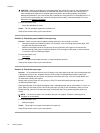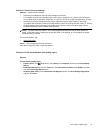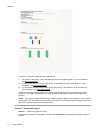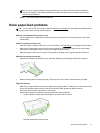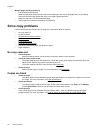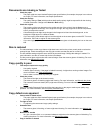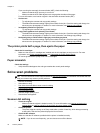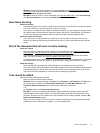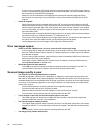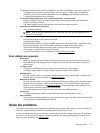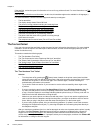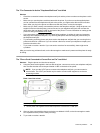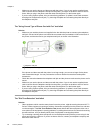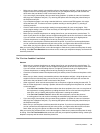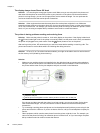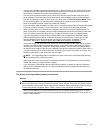
◦ If you are using a separate OCR (optical character recognition) program, the OCR program might be
linked to a word-processing program that does not perform OCR tasks. For more information, see the
documentation provided with the OCR program.
◦ Make sure you have selected an OCR language that corresponds to the language used for the
document you are scanning. For more information, see the documentation provided with the OCR
program.
• Check the originals
◦ When scanning documents as editable text from the ADF, the original must be loaded into the ADF
with the top forward and face up. When scanning from the scanner glass, the original must be loaded
with the top facing the right edge of the scanner glass. Also, make sure the document is not skewed.
For more information, see
Load an original on the scanner glass or Load an original in the automatic
document feeder (ADF).
◦ The software might not recognize text that is tightly spaced. For example, if the text that the software
converts has missing or combined characters, "rn" might appear as "m."
◦ The accuracy of the software depends on the image quality, text size, and structure of the original and
the quality of the scan itself. Make sure that your original has good image quality.
◦ Colored backgrounds can cause images in the foreground to blend too much.
Error messages appear
• Unable to activate TWAIN source or An error occurred while acquiring the image
◦ If you are acquiring an image from another device, such as another scanner, make sure that the other
device is TWAIN-compliant. Devices that are not TWAIN-compliant do not work with the HP software
provided with the printer.
◦ If you are using a USB connection, make sure that you have connected the USB Device Cable to the
correct port on the back of your computer.
◦ Verify that the correct TWAIN source is selected. In the HP software, check the TWAIN source by
selecting Select Scanner on the File menu.
• Reload document and then restart job
◦ Touch OK on the printer control panel, and then reload the remaining documents in the ADF. For
more information, see
Load an original in the automatic document feeder (ADF).
Scanned image quality is poor
• The original is a second-generation photo or picture
Reprinted photographs, such as those in newspapers or magazines, are printed by using tiny dots of ink
that make an interpretation of the original photograph, which degrades the quality. Often, the ink dots form
unwanted patterns that can be detected when the image is scanned or printed or when the image appears
on a screen. If the following suggestions do not solve the problem, you might need to use a better-quality
version of the original.
◦ To eliminate the patterns, try reducing the size of the image after scanning.
◦ Print the scanned image to see if the quality is better.
◦ Make sure that the resolution and color settings are correct for the type of scan job.
◦ For best results, use the scanner glass for scanning rather than the ADF.
• Text or images on the back of a two-sided original appear in the scan
◦ Two-sided originals can "bleed" text or images from the back side to the scan if the originals are
printed on paper that is too thin or too transparent.
• The scanned image is skewed (crooked)
◦ The original might have been loaded incorrectly. Be sure to use the paper guides when you load the
originals into the ADF. For more information, see
Load an original in the automatic document feeder
(ADF).
For best results, use the scanner glass for scanning rather than the ADF.
• The image quality is better when printed
Chapter 8
80 Solve a problem



